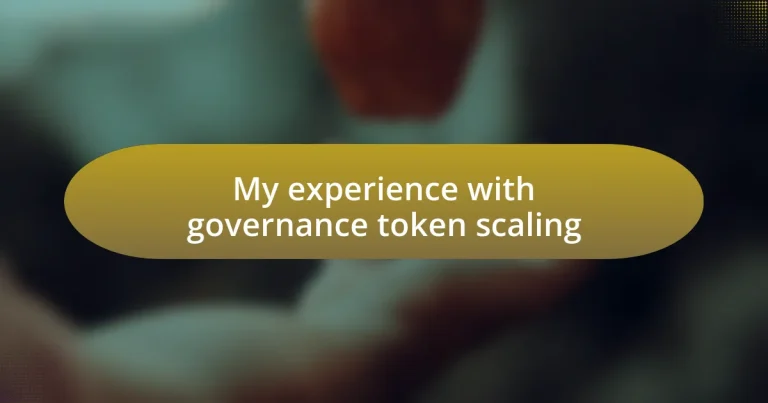Key takeaways:
- Governance tokens empower community members to propose changes and vote, enhancing stakeholder engagement in decision-making.
- Effective scaling requires adaptable voting mechanisms to manage increased participation and prevent vote dilution.
- Case studies reveal the success of community engagement strategies, such as gamification and staggered rollouts, in governance token projects.
- Future trends indicate a shift towards decentralized decision-making models and increased interoperability among governance tokens.
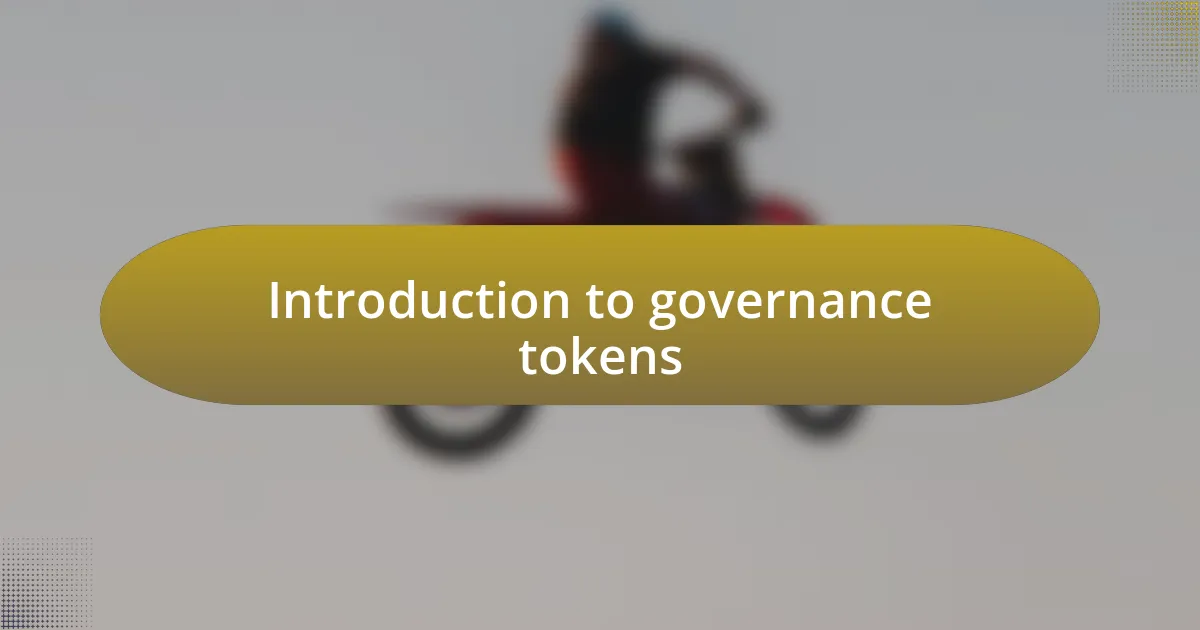
Introduction to governance tokens
Governance tokens represent a transformative shift in how communities and organizations make decisions. I remember the first time I engaged with a governance token platform; it felt empowering to know that my voice could directly influence the future direction of a project I cared about. This level of participation is not just a trend; it’s a fundamental change in stakeholder engagement.
These tokens enable holders to propose changes, vote on initiatives, and participate in the decision-making processes. One particular voting experience stood out for me: the excitement of contributing to a protocol upgrade was palpable. How often do we get the chance to shape the rules of the game so directly? It’s this sense of ownership and collective responsibility that makes governance tokens so appealing.
As we delve deeper into the mechanics of these tokens, it becomes clear that they also introduce new challenges. I have often pondered the sustainability of these governance models—can they truly scale and remain effective as communities grow? By exploring these facets, we uncover the potential and pitfalls of governance tokens in the evolving landscape of decentralized decision-making.
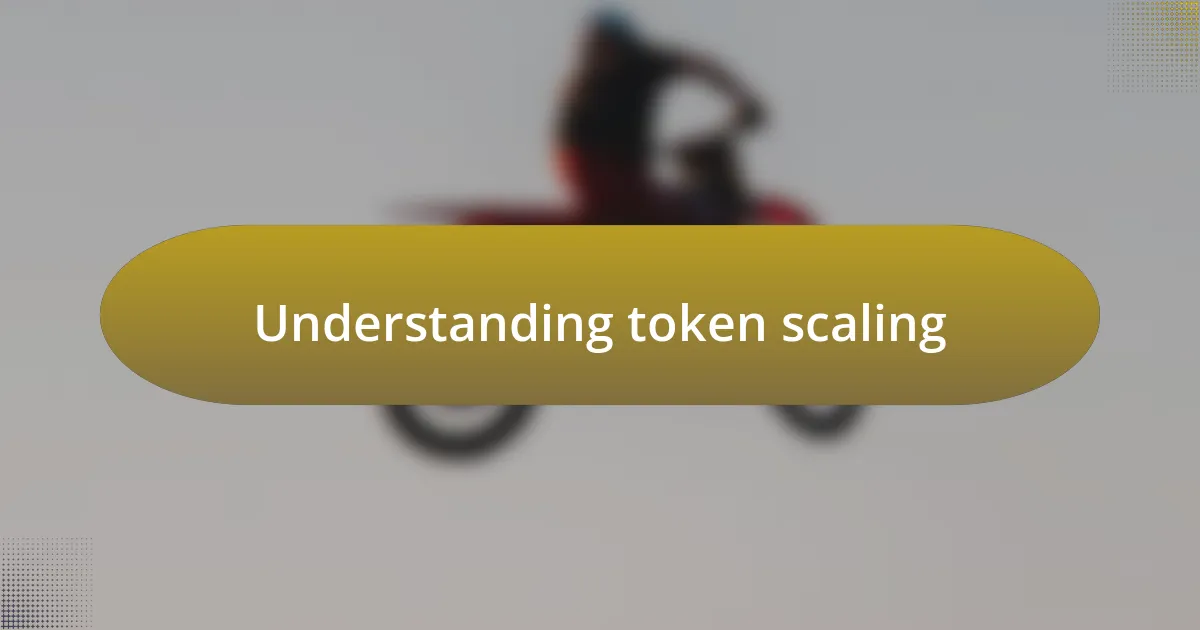
Understanding token scaling
Understanding token scaling
Token scaling refers to the ability of governance tokens to adapt as the community grows. From my experience, I’ve seen that as more individuals participate, the dynamics change considerably. In one instance, I was amazed to see how a small community project had to rethink its tokenomics entirely when membership surged; it was a pivotal moment that taught us all about the importance of scaling.
As tokens scale, they must also balance the weight of increased participation with the need for meaningful decision-making. I recall a time when a rush of new voters overwhelmed our system; the excitement quickly turned to frustration as votes became diluted. This taught me the need for mechanisms that ensure everyone’s voice carries equal weight, regardless of how many join the conversation.
The intricacies of scaling also extend to technology and governance structures. I’ve had moments where technical hurdles led to delays in proposals, reminding me how vital robust platforms are for effective scaling. Each challenge brings a lesson, and as I reflect on these experiences, the importance of thoughtful design in governance tokens becomes increasingly clear.
| Aspect | Explanation |
|---|---|
| Community Growth | Impacts the dynamics and decision-making processes of governance tokens. |
| Dilution of Votes | In large populations, individual votes may carry less influence, necessitating fair voting mechanisms. |
| Technical Challenges | Scaling introduces complexities that can lead to delays and require robust platforms. |

Strategies for effective scaling
When approaching effective scaling for governance tokens, I’ve found that flexibility is key. For instance, during a previous project, we faced a surge in activity that left our systems scrambling. We quickly realized that having adaptable voting mechanisms was essential; without them, we risked losing valuable input from our community.
Here are some strategies that worked well for us:
- Implement dynamic voting systems: Allow for tiered voting weights based on user involvement or contribution levels to maintain fairness.
- Facilitate ongoing education: Equip new members with resources and insights that help them understand the intricacies of the governance process. This engages them more meaningfully.
- Use multi-stage proposals: Breaking down large decisions into stages can prevent overwhelm and foster more targeted discussions.
In my experience, real-time feedback loops can also significantly enhance community involvement. I vividly recall a brainstorming session where everyone was able to voice their opinions without the fear of being drowned out. This constructive exchange amplified our overall decision-making, making participants feel more valued and invested in the outcome.

Case studies on successful scaling
One notable case study I encountered involved a project that successfully scaled its governance token by leveraging a unique blend of community engagement and technology. They created a dedicated platform for discussion and feedback, which not only elevated transparency but also empowered users to feel truly invested in decision-making. I often wonder, how can we replicate such a supportive environment in our own projects?
In another instance, a decentralized finance (DeFi) protocol employed a staggered rollout of governance features, allowing them to gather insights from initial users before a broader launch. This approach not only allowed them to fine-tune their systems but also built excitement and anticipation within the community. It reminded me of how cultivating enthusiasm can significantly enhance user adoption and loyalty.
Additionally, I recall a decentralized autonomous organization (DAO) that integrated gamification into the scaling of its governance token. They utilized points and rewards for active participants who contributed to discussions and proposals. This not only drew in more participants but also transformed the governance process into something enjoyable rather than a chore. It makes me reflect: could fostering a sense of fun in governance yield better engagement in other projects too?
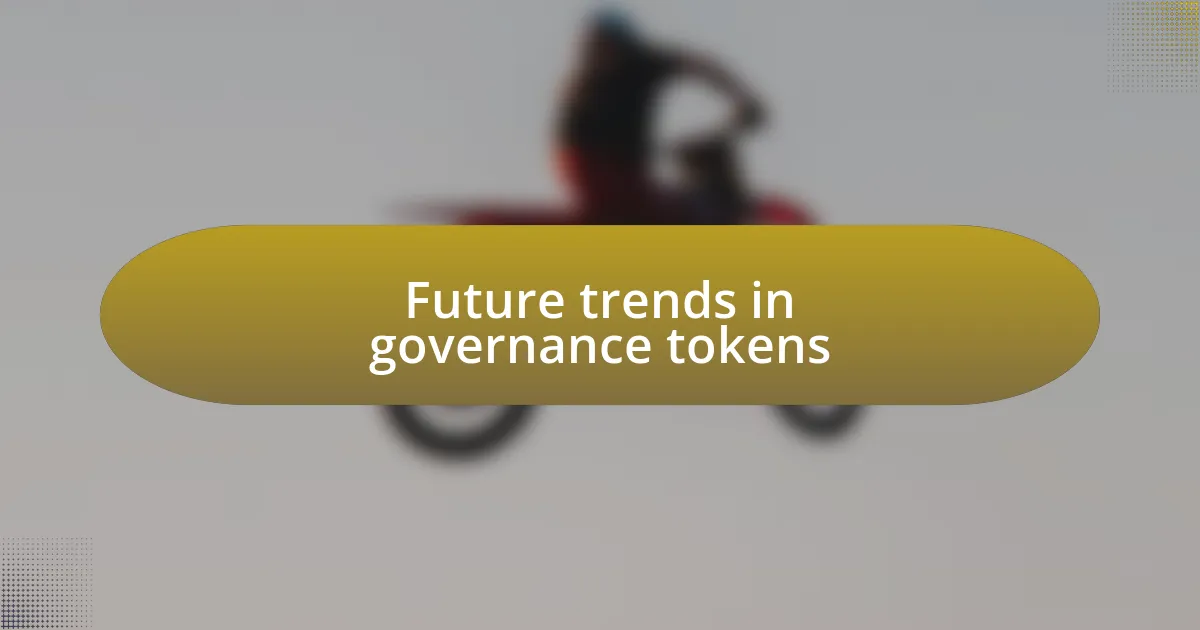
Future trends in governance tokens
Future trends in governance tokens point towards an increased focus on decentralized decision-making models. I’ve noticed that projects are increasingly looking to incorporate multi-dimensional voting systems that offer more than just a simple yes or no vote. This shift can create more nuanced discussions, and I often wonder—how will these systems change the dynamics of community engagement?
As I explore these trends, I see the rising importance of interoperability between different governance tokens. Imagine a scenario where token holders can seamlessly engage with various platforms while maintaining their influence across different ecosystems. This would not only amplify their voices but also strengthen the interconnectedness of our communities. I can’t help but feel excited about how this could foster a richer tapestry of collaboration.
Moreover, I believe that the integration of artificial intelligence in governance processes will become more commonplace. Just thinking about AI analyzing community sentiment to guide proposals gives me a sense of optimism. I wonder if we can find the right balance between technology and human intuition to ensure that governance remains aligned with community values. Future trends in governance tokens may very well hinge on that delicate equilibrium.
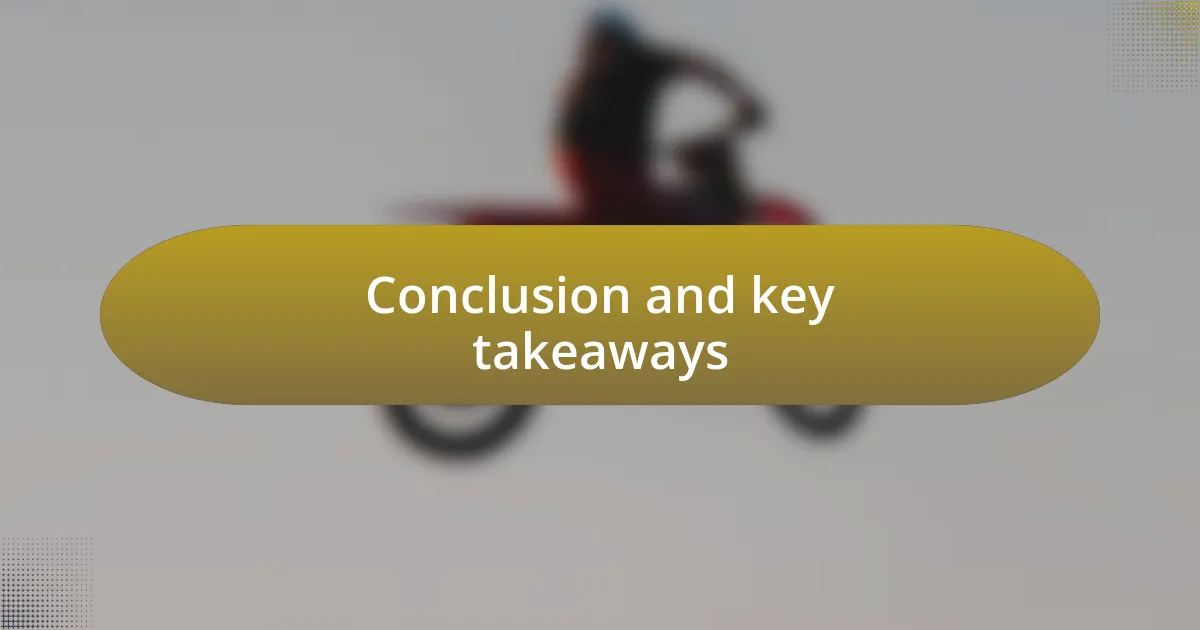
Conclusion and key takeaways
As I reflect on my experiences with governance token scaling, it becomes clear that the journey is a blend of excitement and uncertainty. The evolving landscape of decentralized governance emphasizes the importance of adaptability; those willing to experiment and iterate will likely find themselves at the forefront of innovation. I frequently ask myself, how can we better navigate these shifts to enhance community participation?
One potent takeaway for me has been the undeniable value of community engagement in shaping successful governance models. In my own projects, I’ve witnessed that when stakeholders feel their voices resonate within decision-making processes, their commitment only strengthens. It’s a reminder that genuine interaction is often the catalyst for sustainable growth.
Lastly, I believe that understanding the technical foundations behind governance tokens is essential for anyone looking to thrive in this space. The more I delve into the mechanics, the clearer it becomes that knowledge can empower individuals to make informed choices. Could education become the cornerstone of effective governance, or will we always struggle with the gap between the tech-savvy and the everyday user?

